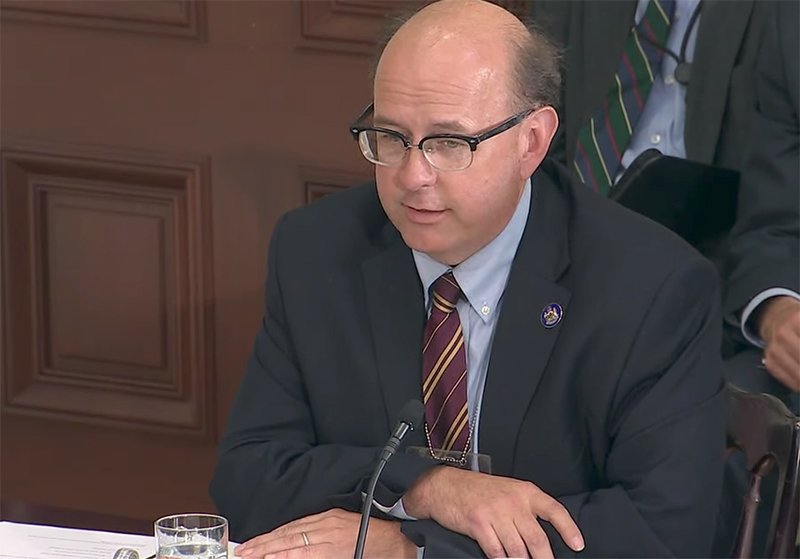A week ahead of its second meeting, President Trump’s voter fraud commission has been accused of violating federal public records laws, according to filings in an ongoing lawsuit by a public interest nonprofit.
The Lawyers Committee for Civil Rights Under Law said in a court filing Tuesday that the commission’s Justice Department lawyer had revealed during a court-ordered Sept. 1 conference call that commissioners and commission staff were using personal email accounts rather than federal ones for official business, a violation of the Presidential Records Act.
Maine Secretary of State Matthew Dunlap, one of four Democrats on the 12-person commission, confirmed Thursday that the commission hadn’t set up federal email accounts for communicating with him and rather had been sending official correspondence to his Gmail account.
“I’m not sure why they were using my personal email, because I gave them my maine-dot-gov address,” Dunlap said in an interview, adding that he’d repeatedly asked them not to because it forced him to forward all of the traffic to his state government account.
Dunlap, whose actions are consistent with Maine public records law, said he wasn’t aware that federal law required the creation of a U.S. government account for the presidential commission. “I did not know we were supposed to have federal email addresses and nobody mentioned that,” he said. “I suspect this is the learning curve of the commission staff because they are new to it, too.”
On Aug. 30, the commission’s lawyer, Justice Department attorney Elizabeth Shapiro, apologized to a federal judge over the body’s failure to uphold a promise to disclose all public records ahead of its first meeting in Washington, D.C., on July 19.
“It was truly an honest misunderstanding on the part of the commission,” Shapiro told U.S. District Court Judge Colleen Kollar-Kotelly during a hearing for the ongoing suit by the Lawyers Committee, which asserted the commission was failing to meet legal mandates on the disclosure of information to the public. “I wanted to convey our apologies and our sincere regret for that.”
During the hearing, Judge Kollar-Kotelly indicated she was more concerned about the emails being captured than what sort of account they were sent from, “at least off the top of my head.” John Freedman, an attorney representing the Lawyer’s Committee, responded they were concerned the commission wasn’t taking sufficient measures to ensure all communications were being captured.
Dunlap has come under fire from fellow Democrats and election fraud experts for agreeing to participate in the body, which Trump set up after making evidence-free claims that he would have won the popular vote had there not been millions of illegal ballots cast in the 2016 election.
Commission Vice Chairman Kris Kobach has sent two controversial requests to election administrators in all 50 states asking them to turn over detailed voter registration information to the commission. Neither of the requests – which were rejected by many blue and red states alike – was made with the prior approval or consultation with the commissioners, raising questions about what if any powers they actually have.
In its first meeting, the commission’s chairman, Vice President Mike Pence, made clear that it will focus almost entirely on voter fraud, a problem numerous studies and probes by administrations of both parties have shown is vanishingly rare, and will not address the systematic intrusion of state election infrastructure by Russia, a problem Sen. Angus King of Maine, an independent, has been especially vocal about.
Dunlap has said he has joined the commission with an open mind and will act as a whistleblower if it engages in partisan shenanigans, and reiterated that position Thursday, though he expressed concerns about commissioners not approving actions taken in their name.
“We are not a commission of one,” Dunlap said. “We should be making these decisions as a body.”
“It does seem like it’s becoming a little bit clunky, given the scrutiny we are under,” Dunlap added. “We haven’t even talked about the second request (for voter data) and it’s not even on the agenda for the second meeting.”
Commissioners are meeting Sept. 12 at St. Anselm College in Manchester, New Hampshire, at the invitation of another Democratic member of the commission, New Hampshire Secretary of State William Gardner.
At the meeting, commissioners will hear presentations from three panels of experts regarding historical election turnout, “election integrity issues affecting public confidence” and electronic voting machines. They also will see a demonstration of a type of voting machine that has been in constant service in the Granite State since 1892.
The Lawyer’s Committee for Civil Rights Under the Law did not respond to interview requests. The voter fraud commission forwarded a request for comment to Nicole Navas Oxman, the spokesperson at the Department of Justice’s civil rights division, which is representing the body in the suit, who declined to comment.
Colin Woodard can be contacted at:
cwoodard@pressherald.com
Send questions/comments to the editors.



Success. Please wait for the page to reload. If the page does not reload within 5 seconds, please refresh the page.
Enter your email and password to access comments.
Hi, to comment on stories you must . This profile is in addition to your subscription and website login.
Already have a commenting profile? .
Invalid username/password.
Please check your email to confirm and complete your registration.
Only subscribers are eligible to post comments. Please subscribe or login first for digital access. Here’s why.
Use the form below to reset your password. When you've submitted your account email, we will send an email with a reset code.